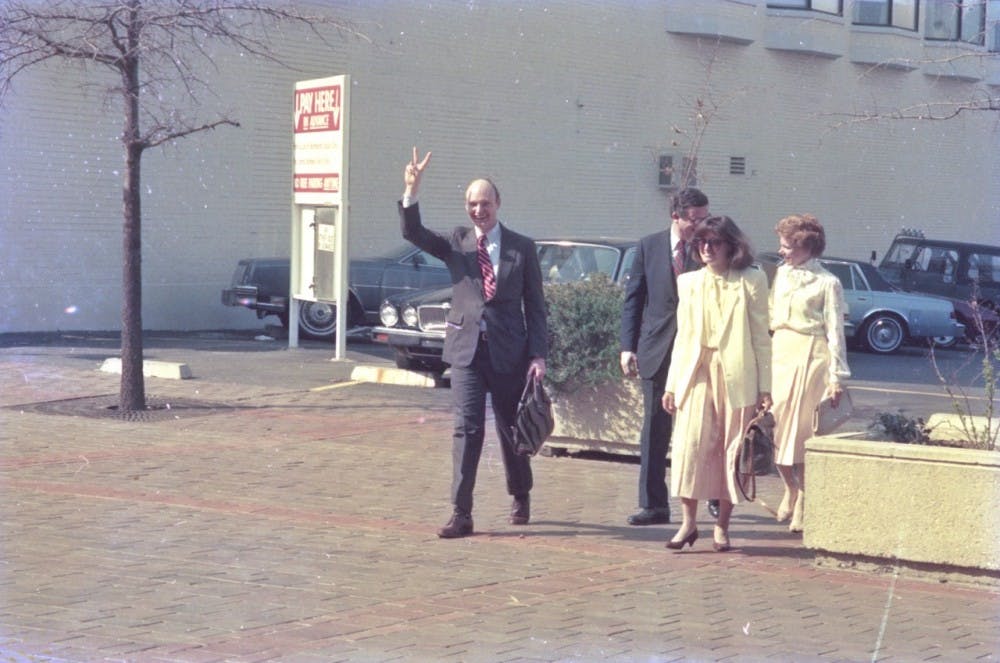After years of running the Democrat without making a profit, Hussman proposed an agreement to work alongside the publisher of the Gazette, Hugh Patterson.
Patterson, who is now deceased, declined Hussman’s offer. WEHCO cut corners in the business, Patterson said in a 2000 interview with the University of Arkansas' Pryor Center, and he didn’t want to work with a paper he assumed would shut down.
Hussman responded by bolstering his smaller paper, nearly doubling the size of its staff and converting to a morning paper for direct competition with the Gazette.
He also brought on John Robert Starr as the Democrat’s managing editor. Soon after he was hired, Starr would pose for a magazine cover clenching a knife between his teeth as he squatted atop a Gazette newspaper box; a declaration of war. Starr also began publishing a daily column that Hussman worried crossed the barrier between news and opinion.
Ernest Dumas, a former writer at the Gazette, told the DTH that the phrase “newspaper war” came mostly from the Hussman-owned paper’s opinion pieces. The Gazette’s staff was ordered not to retaliate, he said.
At the time, the main source of revenue for the Gazette was its classified advertisements. Hussman began offering some of those advertisements for free at the Democrat, while also offering the Gazette’s biggest ad partners cheaper deals.
His rival quickly lost profits, and the Hussman paper’s readership began closing in on the Gazette’s. As pressure grew, the Gazette pressed an antitrust suit against Hussman’s paper in 1984.
Patterson, the Gazette’s publisher, alleged that the rival newspaper was intentionally trying to run the Gazette out of business with predatory pricing tactics. But the court ruled in favor of the Democrat.
In 1986, the Patterson family decided it would not be able to sustain the Gazette any longer, and it was bought out by Gannett Co., a media conglomerate with holdings that include USA Today.
Gannett, like many before them, assumed with the right amount of money, they could outspend Hussman.
Buying a rival
Gannett changed the Gazette to reflect its other publications. However, long-time readers were displeased and turned to the Democrat. Under pressure from profit-seeking shareholders, Gannett decided to close the Gazette after nearly five years.
To get the day's news and headlines in your inbox each morning, sign up for our email newsletters.
Hussman then purchased his rival newsroom.
Dumas said the day the deal was processed he was writing editorials at his desk. Suddenly, every computer in the newsroom shut down, and the staff was informed that the Gazette would be closing immediately.
Hussman sent security guards and photographers to the office, ensuring no assets were stolen or damaged as employees cleared out their desks. Some of the guards shifted through trash to make sure nothing was destroyed, according to multiple first-hand accounts, including Hussman himself.
Hussman said he sent guards because he feared there may be some vandalism in the newsroom. His rival paper had become property of WEHCO in full, including all of the Gazette’s archives and its subscription list. Most newsroom staff were laid off from their positions but two contracted columnists were retained. The rest were invited to fill out an application for positions at Hussman's newspaper.
The Democrat used its front page the next day to flaunt its definitive victory in the newspaper war. But Max Brantley, a former Gazette writer, felt he and his colleagues had been mistreated.
“They were due their happiness, but there was virtually no mention in the extensive coverage that day of the 700 people who had been put out of work,” Brantley said in a Pryor Center interview.
Ninety-five former employees filed a complaint against Gannett because the company had violated federal law regarding advanced notice of upcoming layoffs, which earned them the additional compensation they sought. Hussman was legally obligated to shell out around $2.7 million of that severance pay.
But Brantley told the DTH that employees who had been with the Gazette for more than five years, like himself, didn’t qualify and left empty-handed.
‘Akin to John Wilkes Booth’
The Arkansas Democrat-Gazette will celebrate its 200th birthday in November. Some former members of the Gazette, including Dumas, plan to join Hussman in Arkansas for the celebration.
But others refuse to join.
“I would like to say that is akin to John Wilkes Booth throwing a birthday party for Abraham Lincoln,” Brantley said.
Now, Hussman is setting his eyes on a new challenge: the digital age of journalism.
Hussman capitalized on paywalls and subscription-based services in a time when many newspapers were dropping them.
He said the majority of ad revenue now belongs to internet giants Google and Facebook Inc., so a newspaper business model built on advertising is more difficult these days.
A future where only three newspapers will exist — The Wall Street Journal, The New York Times and The Washington Post — is a fear of Hussman’s. These are the only papers he believes have enough economic scale to grow a healthy digital subscriber base.
The Democrat-Gazette has not turned a profit in years, but Hussman is taking bold steps to improve. He recently spent almost $12 million dollars on iPads that he plans to give for free to people who pay the Democrat-Gazette’s print delivery fee, though print production only happens on Sundays now.
“I think the whole journalism world is kind of watching Little Rock again to see if we succeed at this,” Hussman said.
@MattiasMiller
special.projects@dailytarheel.com



